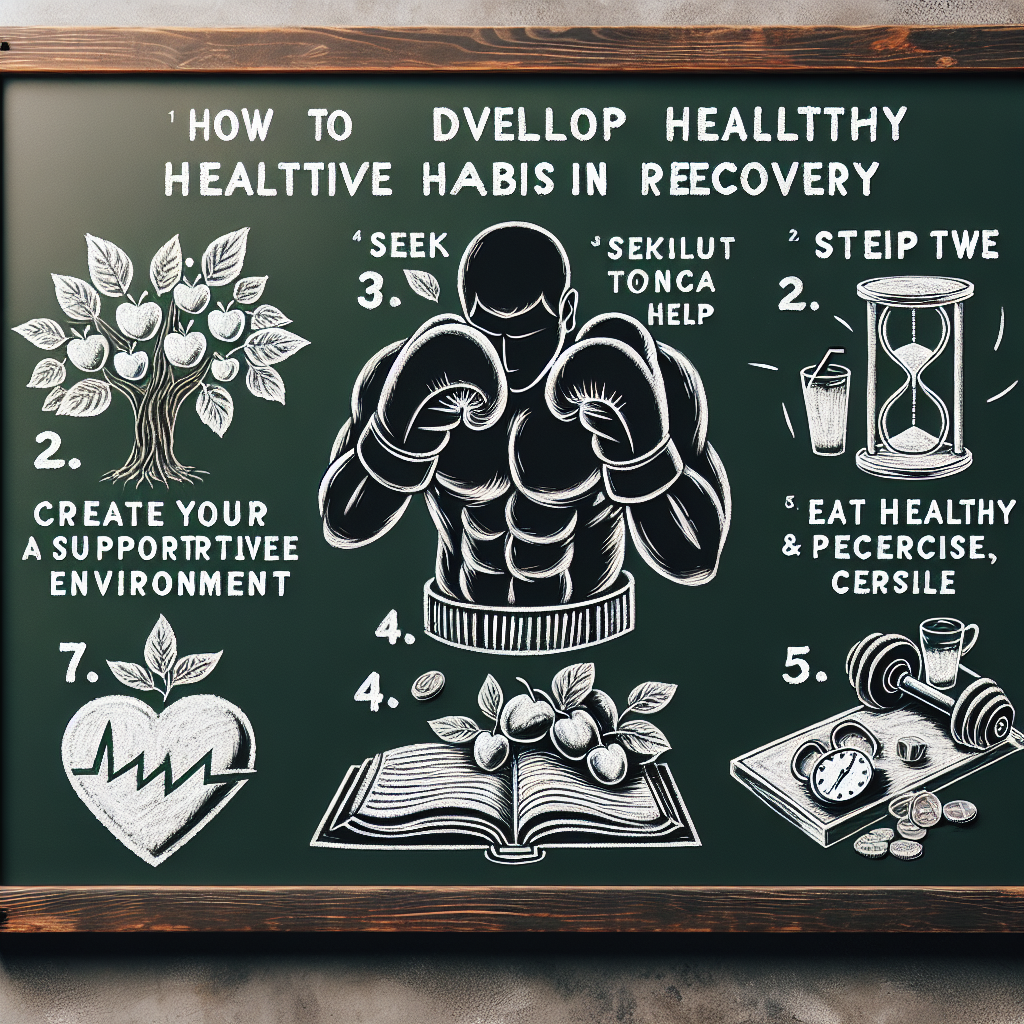-
Table of Contents

“Transform Your Life: Building Healthy Habits for Lasting Recovery”
Introduction
Developing healthy habits in recovery is a crucial step towards achieving long-term sobriety and overall well-being. Recovery from addiction or any form of substance abuse is a challenging journey that requires a comprehensive approach, including physical, mental, and emotional health. Establishing healthy habits can provide the structure and stability needed to navigate this path successfully. This involves creating a balanced lifestyle that incorporates proper nutrition, regular physical activity, adequate sleep, and stress management techniques. Additionally, building a supportive network, setting realistic goals, and practicing mindfulness can significantly enhance the recovery process. By focusing on these key areas, individuals in recovery can foster resilience, improve their quality of life, and reduce the risk of relapse.
Creating a Daily Routine: Key Steps to Building Healthy Habits in Recovery
Creating a daily routine is a cornerstone of building healthy habits in recovery. Establishing a structured schedule can provide a sense of stability and predictability, which is crucial for those navigating the often tumultuous journey of recovery. To begin with, it is essential to recognize that developing a daily routine is not about rigidly adhering to a timetable but rather about creating a balanced framework that supports your well-being and growth.
One of the first steps in creating a daily routine is to prioritize self-care. This involves setting aside time each day for activities that nurture your physical, emotional, and mental health. For instance, incorporating regular exercise into your routine can have profound benefits. Whether it’s a morning jog, a yoga session, or a simple walk in the park, physical activity can boost your mood, reduce stress, and improve overall health. Additionally, ensuring you get adequate sleep is vital. Establishing a consistent sleep schedule can help regulate your body’s internal clock, making it easier to fall asleep and wake up at the same time each day.
Another critical aspect of a daily routine is nutrition. Eating balanced meals at regular intervals can stabilize your energy levels and improve your mood. Planning your meals ahead of time can prevent impulsive eating and ensure you are consuming a variety of nutrients. Moreover, staying hydrated by drinking plenty of water throughout the day is equally important.
In addition to physical health, mental and emotional well-being should be a focal point of your daily routine. Incorporating mindfulness practices such as meditation, deep breathing exercises, or journaling can help you stay grounded and present. These practices can also provide a healthy outlet for processing emotions and reducing anxiety. Furthermore, setting aside time for hobbies and activities that bring you joy can enhance your overall sense of fulfillment and purpose.
Social connections play a significant role in recovery, and integrating social activities into your daily routine can provide much-needed support and encouragement. Whether it’s attending support group meetings, spending time with loved ones, or engaging in community activities, fostering positive relationships can help you stay motivated and accountable.
As you develop your daily routine, it is important to set realistic and achievable goals. Start with small, manageable steps and gradually build upon them. For example, if you aim to exercise regularly, begin with short, simple workouts and slowly increase the duration and intensity as you become more comfortable. Celebrating your progress, no matter how small, can boost your confidence and reinforce your commitment to your recovery journey.
Flexibility is also key when creating a daily routine. Life is unpredictable, and there will be days when things don’t go as planned. Allow yourself the grace to adapt and make adjustments as needed. The goal is to create a routine that supports your recovery, not to add additional stress or pressure.
In conclusion, developing healthy habits in recovery through a well-structured daily routine can provide a solid foundation for long-term success. By prioritizing self-care, nutrition, mental and emotional well-being, social connections, and setting realistic goals, you can create a balanced and fulfilling routine that supports your journey. Remember, recovery is a continuous process, and each day presents an opportunity to grow and thrive. Embrace the journey with patience, perseverance, and self-compassion, and you will find yourself building a life of health, happiness, and resilience.
Mindfulness and Meditation: Essential Practices for Developing Healthy Habits in Recovery
In the journey of recovery, developing healthy habits is crucial for long-term success and well-being. Among the myriad of strategies available, mindfulness and meditation stand out as essential practices that can significantly aid in this transformative process. These practices not only help in managing stress and anxiety but also foster a deeper connection with oneself, which is vital for sustained recovery.
Mindfulness, at its core, is the practice of being fully present in the moment, aware of where we are and what we are doing, without being overly reactive or overwhelmed by what’s happening around us. This heightened state of awareness can be incredibly beneficial for individuals in recovery, as it allows them to recognize and address negative thought patterns and behaviors before they spiral out of control. By cultivating mindfulness, one can develop a greater sense of control over their actions and reactions, which is a fundamental aspect of building healthy habits.
Transitioning from mindfulness to meditation, it becomes evident that these practices are deeply interconnected. Meditation serves as a structured approach to achieving mindfulness. Through regular meditation, individuals can train their minds to focus, relax, and achieve a state of calmness. This practice can be particularly powerful in recovery, as it provides a safe space to explore and process emotions that may have been suppressed or ignored. By dedicating time each day to meditation, individuals can gradually build resilience and emotional stability, which are essential for maintaining healthy habits.
Moreover, the benefits of mindfulness and meditation extend beyond emotional regulation. These practices have been shown to improve physical health by reducing stress-related ailments such as high blood pressure, insomnia, and chronic pain. For someone in recovery, this holistic improvement in well-being can be a strong motivator to continue practicing mindfulness and meditation. As physical health improves, so does the capacity to engage in other healthy habits, such as regular exercise and balanced nutrition, creating a positive feedback loop that supports overall recovery.
Incorporating mindfulness and meditation into daily routines may seem daunting at first, but it is important to start small and be consistent. Simple practices, such as mindful breathing or a short guided meditation, can be a good starting point. Over time, as these practices become more familiar, they can be expanded and integrated into various aspects of daily life. For instance, mindful eating can transform mealtime into an opportunity for reflection and gratitude, while mindful walking can turn a simple stroll into a meditative experience.
Furthermore, it is essential to recognize that mindfulness and meditation are not about achieving perfection but about progress and self-compassion. Recovery is a journey with its own set of challenges and setbacks. By approaching mindfulness and meditation with an open heart and a non-judgmental attitude, individuals can cultivate a sense of acceptance and patience with themselves. This mindset is crucial for developing and sustaining healthy habits, as it encourages perseverance and resilience in the face of difficulties.
In conclusion, mindfulness and meditation are indispensable tools for anyone seeking to develop healthy habits in recovery. These practices offer a pathway to greater self-awareness, emotional stability, and physical well-being. By integrating mindfulness and meditation into daily life, individuals can create a solid foundation for lasting recovery and a healthier, more fulfilling life. The journey may be challenging, but with dedication and compassion, it is entirely possible to transform one’s habits and, ultimately, one’s life.
Q&A
1. **Question:** What is one effective strategy for developing healthy habits in recovery?
**Answer:** One effective strategy is to establish a daily routine that includes regular exercise, balanced meals, and sufficient sleep to create structure and promote physical and mental well-being.
2. **Question:** How can setting goals aid in developing healthy habits during recovery?
**Answer:** Setting specific, achievable goals can provide direction and motivation, helping individuals to focus on positive behaviors and track their progress, which reinforces the development of healthy habits.
Conclusion
Developing healthy habits in recovery involves setting clear, achievable goals, establishing a structured routine, seeking support from a community or support group, practicing mindfulness and stress management techniques, maintaining a balanced diet and regular exercise, and continuously monitoring and adjusting habits to ensure long-term success and well-being.



